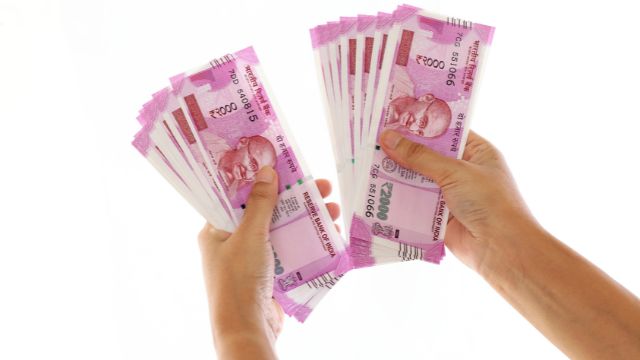Quite recently the news broke out saying “RBI is pulling out the Rs. 2000 notes from circulation.” And this resulted in a lot of confusion among the general public, especially those who aren’t aware of the decision at all. As of now, we can only speculate that RBI made this decision for the good of the Indian banking system and for the people of India, but many are beginning to think that this could lead to some unforeseen circumstances in the near future. And that’s the reason we have decided to come up with this post where we will be shedding light on the advantages as well as disadvantages of Rs.2000 notes demonetization in India. So let’s get down to it then, shall we?
What Are The Reasons Behind Rs.2000 Note Demonetization?
You might be wondering, “Is this some sort of demonetization strategy?” Well nah, nothing so dramatic actually. It’s more like a spring cleaning thing, you know, keeping everything fresh and tidy. They did the same with all pre-2005 banknotes a few years back. Here’s the thing though. Even though the RBI hit the pause button on these notes, you can still use them. They’re still considered legal bills.
But why did the RBI decide to bench the INR 2,000 notes? Good question! For starters, the people of India weren’t really using these notes much. Plus, the RBI figured that there were enough banknotes of other denominations around to keep the wheels of commerce spinning. However, as of now, the RBI has politely asked all banks to stop handing out Rs. 2,000 notes. But until September 30, 2023, you can march into any bank branch, dump your pile of 2,000 INR notes into your bank account, or swap them for smaller value notes like 500 ones.
Rs.2000 Note Demonetization Advantages
RBI has made this decision, so there must be some reason behind it right? Well yeah, there are some things that will improve by pulling out the Rs. 2000 notes from circulation. And here are the most prominent ones:
- Increase in Bank Deposits
As everyone starts bringing their INR 2000 notes back to the banks, these financial institutions could see a serious spike in deposits. Now, this is crucial, especially at a time when the growth in bank deposits has been like a sleepy snail compared to the pace of credit growth. More deposits mean less strain on banks to jack up deposit rates. It’s a win-win for both banks and customers. Imagine, the banks get a cash influx, and customers potentially get to enjoy lower deposit rates.
- More Liquidity in Banking System
With all those 2000 rupee notes flowing back into banks, we could see a rush of liquidity. This means banks would have more cash to hand out as loans, creating a positive domino effect that could boost economic activity and growth. It’s like giving our economy a good shot of espresso at a time when the risk of record-breaking inflation is at an all-time high.
- A Big Push for Digital Transactions
Pulling the high-value notes out of the game could seriously dial down cash transactions and give a big thumbs up to digital payments. Quite recently, India hit the target of record-breaking UPI transactions, and this move from the RBI is only going to result in more and more digital payments. In our opinion, it can be quite the catalyst for driving financial inclusion and transparency.
- Potential Drop in Short-Term Interest Rates
With the surge in bank deposits, we might see short-term interest rates take a dip down as these funds get channeled into shorter-term government securities. Now, this could be great news for borrowers, especially businesses on the hunt for short-term loans. After all, who doesn’t like lower interest rates?
Rs.2000 Note Demonetization Disadvantages
At this point, you may be wondering, what could be the potential downsides of pulling the Rs. 2000 notes out of circulation? Well, there is a lot to talk about here, let’s get down to it.
- Public Panic and Misinformation
You know how it goes. Any significant financial shift tends to send waves of panic and misinformation rippling through the public. It’s like a sequel to the 2016 demonetization movie we all didn’t want to see. The sudden announcement can cause a lot of anxiety and confusion, especially for people who aren’t well-versed with the nitty-gritty of the decision.
- Inconvenience to Small Businesses and Cash-Oriented Sectors
If there’s one thing we can agree on, it’s that small businesses and industries such as agriculture and construction love their cash transactions. It’s all about simplicity and immediacy for them because cash is king, after all. Removing the INR 2000 notes from the game could throw a wrench into their operations.
- Turning Everyone into Cash Hoarders
What do people do when something becomes scarce? They start hoarding it. The withdrawal of INR 2000 notes could potentially cause folks to start stockpiling smaller value notes like squirrels stashing acorns for winter. This surely results in a shortage of these smaller notes in circulation, which can cause a hiccup in everyday transactions.
- Questions Over The Decision-Making Process
Last, but certainly not least, there’s a fair bit of side-eye being thrown at the decision-making process behind the withdrawal of the INR 2000 notes. The lack of clear communication between the government and the Reserve Bank of India has left people feeling like they’re trying to put together a jigsaw puzzle with missing pieces. This sort of confusion and uncertainty could damage public trust in our financial institutions, much like a series of bad calls can make us question an umpire’s abilities.
Conclusion
Now you know what could be the potential pros and cons of removing such a high-value bill from circulation in the country. However, it isn’t something to worry about in our opinion because it is far different from the demonetization of 2016. But nothing can be said with 100% accuracy, there could be some not-so-good effect of this decision. Until then, we hope that this post has cleared out your confusion regarding this decision made by RBI.















